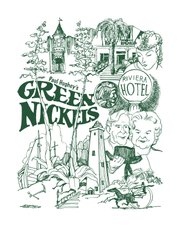Monday, January 13, 2014
When Paul Hughey died at age 75, he left behind an old possession in his Gulfport home that would fuel a powerful goal for his daughter. Among the items was a record of a long and fulfilled life on the Mississippi coast that served as a window into a different era, which Susan Hughey Hogan worked to turn into a new e-book, "Green Nickels."
'Green Nickels' is based on conversations my father had with fishermen on the coast and other people he knew in the '60s, people who lived in the schooner days of Biloxi," Hogan told the Jackson Free Press. "It tells how these people lived."
Hogan, 66, was born in her father's lifelong home of Gulfport and attended Gulfport High School. When she graduated in 1965, she went on to attend Mississippi University for Women in Columbus, where she studied journalism and computer science, and then Jackson State University, where she majored and received a master's degree in math.
In 1975, Hogan moved to Jackson, where she still lives today. She took a job as a teacher at Wingfield High School, where she taught mainly math and journalism along with a few other subjects over the course of her career. She is currently retired.
After her father died, Hogan found four different revised manuscripts for a book he had been working on in his house. Years later, in October 2013, she also found a number of cassette tapes of interviews Hughey conducted while working on his project. Hogan knew of the book her father had been working on with a friend of his who was an English professor at the University of Southern Mississippi, whose name Hogan could not recall. The book revolves around the lives of Paul Hughey's family and friends in Gulfport and is told through anecdotes and interviews. Hogan published the book in early December 2013.
"I consider my dad's book one of the greatest gifts he left his family," Hogan said in a press release. "He wanted to share his story with others as he wrote about his uncle going to work in his bare feet when his shoes wore out and about one of the other schooner men who once worked for the hermit of Deer Island."
Paul Hughey was born in 1920 in Bogalusa, La. His grandmother raised him from the time he was only a few months old. He dropped out of school in eighth grade and later joined the army.
Hughey was deployed to Europe during World War II, where he served in the Mediterranean and Middle East Theatres. While serving, enemy fire hit a tank he was riding in, and he lay in a roadside ditch for several days before medical help arrived. He underwent insulin and shock therapy treatments at the Gulfport Veterans Neuropsychiatric Division at a time when the term post-traumatic stress disorder didn't exist and clinical psychology was still an emerging field. Doctors hospitalized him for months at a time whenever he suffered breakdowns.
After the war, Hughey returned to Gulfport and took a job as a compositor at the newspaper "The Daily Herald." Hughey's newspaper work brought out his inquisitive side, leading him to develop a desire to learn more about Biloxi's schooner days. Hughey began carrying his cassette player and notepad to record conversations with several of the old fishermen in the area, including his uncle, Frank Torries. Hogan described her father's research work as being like "therapy for his soul."
The book recounts lost stories about Mississippi's past. "My aunt lived in a seafood factory with her family," Hogan said. "They didn't have child-labor laws back then. Kids sat down next to their parents working in the factories. My aunt and uncle moved to the coast on the back of a horse and buggy. My uncle worked on the coast highway barefoot and worked as a moonshiner because he didn't have money. He dropped out of school before second grade. There's another story in the book about the man who owned the first car in Mississippi. He charged people a quarter to ride in it, and on the second day he got a flat tire. He had to send it to New Orleans by train for a new tire. We don't appreciate what people had to do back then."
Hogan is glad to have gotten the book published, even if it took her longer than she meant for it to happen.
"It was something my father wanted to do, and I wanted to do it when I had time and kept putting it off," Hogan said. "I got a little frustrated because of the different versions of the manuscript. It was hard to tell when he wrote what."
Of all the anecdotes and interviews in the book, the last holds especially great significance for Hogan.
"The last part of the book is a talk with my aunt," Hogan said. "She told my father, 'When you write your book, tell them we had fun.' And they did. People back then knew what was going on in their community. They were involved. They talked about it. They were there to help their families and neighbors. That last sentence touches my soul. They enjoyed their lives and had no regrets."
Hogan and her husband of 42 years, Colin Hogan, have 3 children: Eric, age 40, Olivia, 38, and Kimberly, 36.
"Green Nickels" is a self-published e-book available for free on iTunes. Download the book here.


Comments
Use the comment form below to begin a discussion about this content.
Sign in to comment
Or login with:
OpenID